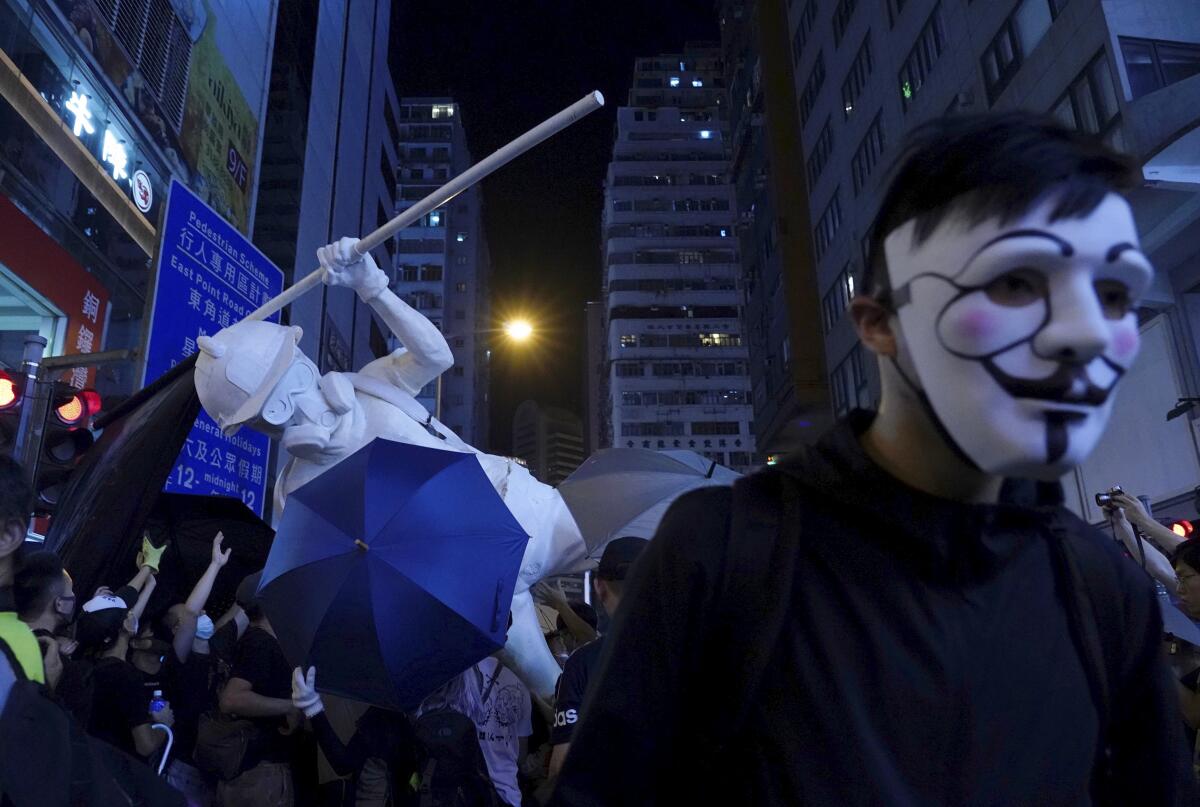Why the U.S. won’t go to the mat for the subjugated people of Hong Kong

- Share via
The last time I was in Hong Kong, I stood high on a hill above the vertical city looking down from the German ambassador’s residence on an unruly, free-spirited metropolis in the midst of a popular uprising.
The democracy protests were at their height in those weeks near the end of 2019, and the city still felt giddily free and hopeful. Posters calling for the liberation of Hong Kong from Chinese rule, and for the victory of democracy over totalitarianism, were plastered on the walls. Photos of anti-riot police waving guns and shooting tear gas were being scraped from the underground tunnels by authorities. Whispers of where the next protest would take place floated through the city.
Perhaps I should’ve understood more clearly what lay ahead when I heard Hu Xijin, a Chinese journalist from a state-run newspaper, speak at the conference I was attending. He angrily defended the mainland’s heavy-handed policies and aggressively cautioned the United States not to tell China what to do. The protesters are violent, he said, adding that if similar demonstrations had occurred in the West, the marchers would undoubtedly have been shot.
“We’re not interfering with your country, why should you interfere with us?” he said. “Why should we obey your orders?”
And they haven’t. Instead, exactly a year ago Wednesday, on June 30, 2020, China imposed a draconian national security law on the city. Since then, independent newspapers have been closed down, protests quashed and more than 10,000 people arrested for crimes such as “uttering seditious words.”
As Human Rights Watch noted in a report issued last week, the Chinese government is now pressing residents to pledge public loyalty to the government in Beijing. It is turning the police and courts into “tools of Chinese state control rather than independent and impartial enforcers of the rule of law.” Candidates considered insufficiently loyal to China have been barred from running for Hong Kong’s electoral council. Academic freedom is under attack. Websites have been blocked, museums harassed, films canceled, political slogans banned, school curricula rewritten. Books have been removed from libraries.
Watching a country move from freedom to subjugation is heart-rending. And perhaps the most frustrating part is that the United States and the international community seem unlikely to do much about it.
For one thing, the U.S. can’t easily bully a fellow superpower like China, with its rising economy and substantial arsenal. And there are many critically important issues on which we and China must cooperate. The Biden administration has to take a risk-versus-benefits approach. Are we willing to risk cooperation on climate change to defend the freedom of Hong Kong? Will we stop trading with China to combat censorship and repression? Will we jeopardize the possibility of collaboration on Iranian nuclear proliferation?
It’s true that China has abrogated its commitments to the onetime British colony. But American policy makers, who don’t see Hong Kong as a fundamental or core national interest, will only go so far. The U.S. can express its grave concerns and its dismay. It can slap on sanctions, as it has, including on Hong Kong’s chief executive, Carrie Lam, who has embraced Beijing’s mandates. It can and should cooperate with other democratic countries to shame China, if that’s possible, including at the 2022 Winter Olympics in Beijing.
But in the end, few people believe the U.S. will go to the mat for the people of Hong Kong. And given China’s record of imposing control in places like Tibet and Muslim-areas of China, things could get a lot rockier.
“We don’t have the luxury of building a foreign policy that is centered on promoting the rule of democracy and human rights, so our influence is limited,” says Richard Haass, the former director of policy planning for the U.S. State Department who is now president of the Council on Foreign Relations. “We can vent, but we should have no illusions that it’ll change the situation on the ground in Hong Kong. That may seem cruel, but it’s a fact of life.”
Samuel Chu, managing director of the Hong Kong Democracy Council in Washington, is more optimistic. Chu, who has a warrant out for his arrest under the national security law, says he sees vulnerability on the part of China and a global shift of sentiment since the Hong Kong crackdown. He says there’s a lot to be done: helping fight censorship and circumvent the coming internet firewall, helping activists get out of the country when China comes after them, working to strengthen the civil society groups and pressuring businesses in Hong Kong not to go along with the repression.
Hong Kong’s problems began when the British handed the territory back to China in 1997 after a century and a half of colonial rule. Under their agreement, Hong Kong was to be granted a 50-year interim period during which it would retain its capitalist economy and its democratic freedoms under a policy known as “one country, two systems.” In 2047, the city was to fall under full Chinese control.
But China hasn’t waited; it has been chipping away at Hong Kong’s freedom since the handover.
In 2015, I met with the young Hong Kong activist Joshua Wong in my office when he was only 18 years old and already a hero at home. Brave and upbeat, he told me how he fit his democracy activism into a schedule that also required him to do his homework.
Now Wong is in prison again, this time sentenced to 10 months for lighting candles and sitting in the park peacefully to commemorate the 30th anniversary of the Tiananmen Square massacre in 1989.
The chance of a return to more freedom seems slim. But I can’t help hoping for a turnabout, for Joshua Wong’s sake, for the sake of the residents of Hong Kong and for the sake of democracy around the world.
@Nick_Goldberg
More to Read
A cure for the common opinion
Get thought-provoking perspectives with our weekly newsletter.
You may occasionally receive promotional content from the Los Angeles Times.










